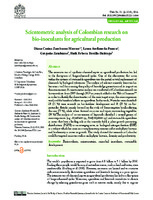Scientometric analysis of Colombian research on bio-inoculants for agricultural production

Fecha
2016Autor
Zambrano-Moreno, Diana
Avellaneda-Franco, Laura
Zambrano, Gregorio
Bonilla-Buitrago, Ruth
Metadatos
Mostrar el registro completo del ítemResumen
The excessive use of synthetic chemical inputs in agricultural production has led to the disruption of biogeochemical cycles. One of the alternatives that arose within the systems of sustainable agriculture was the partial or total replacement of chemicals by biological substances. The analysis of relevant scientific literature has become a tool for assessing the quality of knowledge generation and its impact on the environment. A scientometric analysis was conducted of Colombian research on bio-inoculants from 2009 through 2014 in journals added to the Web of SciencesTM in order to identify the characteristics of the main target crops, the microorganisms used, and the beneficial effects on agriculture. In this work, 34 articles were identified: 24 (71 %) were research on bio-fertilizer development and 10 (29 %) on bio-pesticides. Articles mainly focused on the study of Gram-negative bacilli affecting the area (77 %), while others focused on issues and topics surrounding vegetables (30 %).The analysis of co-occurrence of keywords identified: i. several genera of microorganisms (e.g. Azotobacter sp., Bradyrhizobium sp.) and sustainable agriculture as issues that have a leading role in this scientific field, ii. plant growth promoting rhizobacteria (PGPR) as an emerging issue, iii. biological nitrogen fixation (BNF) as a subject which has risen in a complementary manner and iv. endophytic bacteria and biodiversity as issues in growth. This study showed that research in Colombia could be targeted on issues such as endophytic bacteria, diversity and productivity.
Descripción
Artículo científico
Fuente
Universitas ScientiarumCompartir
Métricas
Colecciones
- Artículos [40]
El ítem tiene asociados los siguientes ficheros de licencia:


